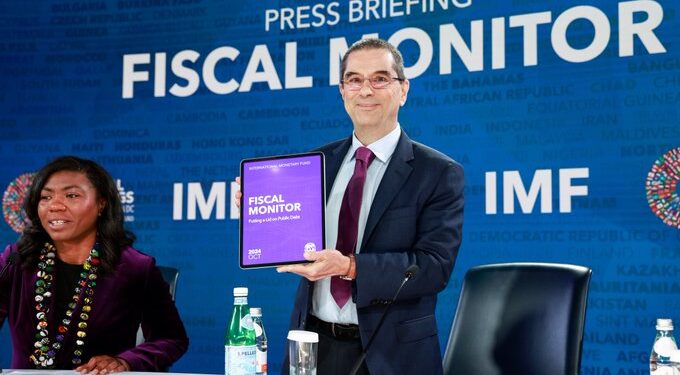IMF Urges Swift Fiscal Reforms as Global Debt Risks Mount
The IMF’s recommendations for developing nations focus on revenue mobilization strategies that promote efficiency, equity, and progressivity in tax systems.
- Advertisement -
The International Monetary Fund has issued a stark warning about the risks of delayed fiscal adjustments, emphasizing the need for immediate action to address mounting global debt concerns during its annual meetings in Washington.
Vitor Gaspar, Director of the IMF’s Fiscal Affairs Department, stressed that postponing necessary fiscal reforms could prove “costly and risky” for both advanced and developing economies. Speaking at the Fiscal Monitor press briefing, he outlined a comprehensive framework for successful fiscal consolidation, emphasizing that adjustments should be “timely, decisive, well-designed, and effectively communicated.”
- Advertisement -
The Fund’s Director of the IMF’s Fiscal Affairs Department in answering a question during the press briefing shared a story on an innovative “Three Ts” approach to fiscal governance – Technology, Transparency, and Trust – drawing inspiration from India’s recent reforms. This framework suggests that technological advancement in fiscal management can enhance transparency, which in turn builds public trust and improves tax compliance.
- Advertisement -
Era Dabla-Norris, Deputy Director of the Fiscal Affairs Department, highlighted the importance of carefully designed fiscal adjustments that minimize negative impacts on growth and inequality. “There is a right way to do it, and there are many wrong ways to do it,” she noted, emphasizing that different fiscal instruments carry varying implications for economic stability.
The IMF’s analysis suggests that progressive taxation has distinctly different effects on consumption and work incentives compared to other forms of revenue generation. Similarly, reducing public investment can have both immediate negative effects on growth and longer-term implications for wages, while cutting regressive energy subsidies might have less severe impacts on lower-income populations.
For developing nations, particularly in Sub-Saharan Africa, the challenges are more acute. Davide Furceri, Division Chief of the Fiscal Affairs Department, revealed that many countries face spending needs of up to 16% of GDP to meet sustainable development and climate goals. The IMF has responded by providing approximately $60 billion in funding to African economies over the past four years.
The Fund’s support extends beyond direct financing, encompassing technical assistance in critical areas such as public finance management, taxation efficiency, and climate change initiatives. “Building fiscal space is not only crucial to limit public debt risks, but in many countries in sub-Saharan Africa, it is key to enable the state to play its full role in development,” Gaspar emphasized.
- Advertisement -
The IMF’s recommendations for developing nations focus on revenue mobilization strategies that promote efficiency, equity, and progressivity in tax systems. Key measures include reducing informal economic activity, broadening tax bases, and improving collection efficiency.
The briefing comes amid growing concerns about global debt sustainability, with many countries struggling to balance post-pandemic recovery with fiscal consolidation. The IMF’s message is clear: countries must act decisively to implement fiscal reforms while ensuring these adjustments don’t disproportionately affect vulnerable populations.
As global financial markets remain volatile, the IMF’s guidance emphasizes the delicate balance between necessary fiscal tightening and maintaining economic growth. With interest rates remaining elevated in many economies, the cost of delaying these adjustments could become increasingly severe.
The Fund’s recommendations reflect a growing recognition that fiscal policy must be both technically sound and socially sustainable, particularly as countries navigate complex challenges including climate change, technological transformation, and persistent inequality.
Below is the link to the full Fiscal Monitor Report
https://www.imf.org/en/Publications/FM/Issues/2024/10/23/fiscal-monitor-october-2024
Source:norvanreports.com
- Advertisement -


